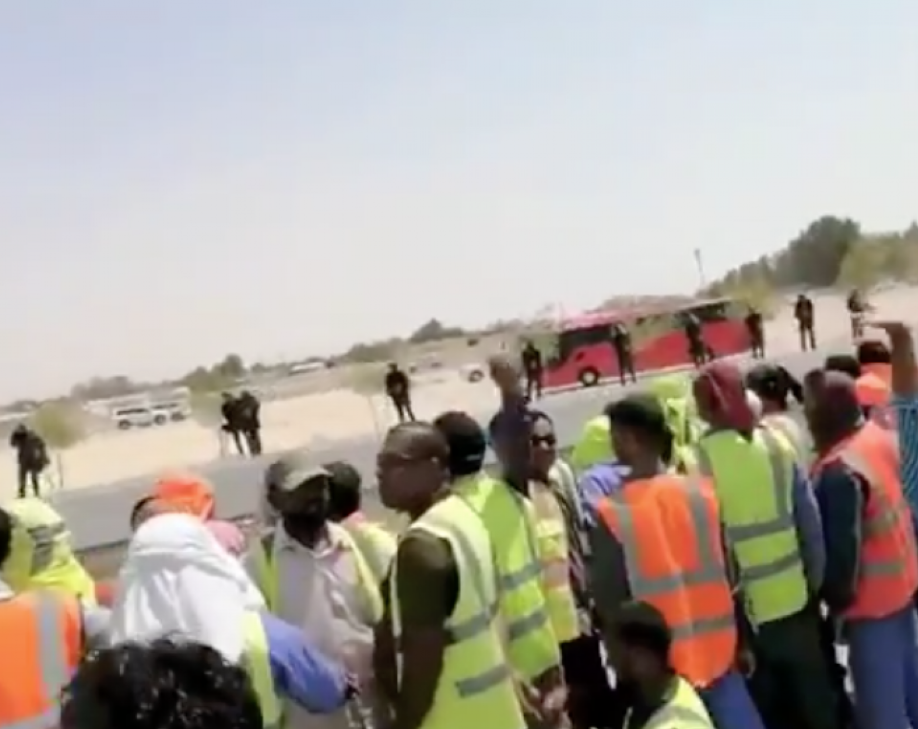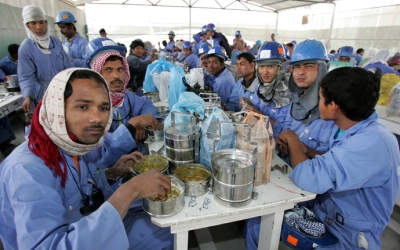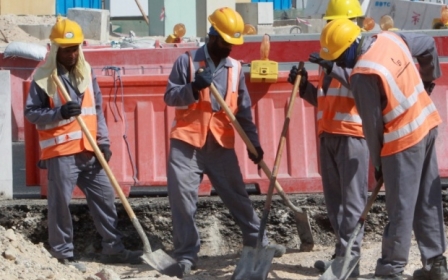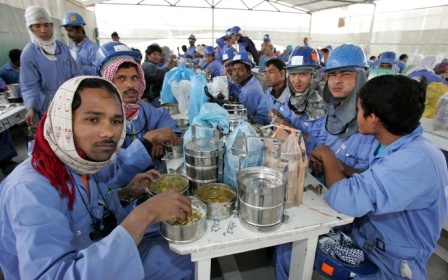Migrant workers in Qatar win salaries and concessions after strike action

Workers inside Qatar have won concessions after hundreds of labourers went on a rare strike in the emirate earlier this month to oppose delays in salary payments, according to a government statement.
Images posted online showed hundreds of workers, mainly from Bangladesh, blocking the Dukhan highway after their employers refused to pay two months worth of salaries.
Following the protests, workers entered into negotiations with Qatari officials to discuss their demands. The negotiations led to the workers receiving two months worth of salaries they had been due and Qatari authorities arresting company officials who had refused to pay the workers' wages.
New MEE newsletter: Jerusalem Dispatch
Sign up to get the latest insights and analysis on Israel-Palestine, alongside Turkey Unpacked and other MEE newsletters
In a statement sent to Middle East Eye, a Qatari government spokesperson said: "An investigation was immediately launched and the authorised signatories of the two companies in question were arrested.
"After consultation with all stakeholders, the outstanding salaries of all workers were paid in full through the Wage Protection System [WPS]. Workers also have the right to change their employer due to the violation of Qatar’s labour laws."
The government spokesperson refused to give details of which companies had been ordered to pay back the salaries owed.
A worker involved in organising the protests confirmed to MEE that the companies had now paid out the salaries. The worker, however, requested to remain anonymous as trade unions are illegal in Qatar.
"Officials also gave us a no-objection certificate [NOC], which would allow us to change employers and many workers have applied to get a NOC."
The no-objection certificate is a Qatari document that enables workers to change employers. If a worker does not have a NOC then they are unable to leave without their employer's permission.
A labour activist, who wished to remain anonymous, told MEE that the protests were not related to projects for Qatar's 2022 World Cup but took place across Labour City, where the vast majority of migrant workers reside.
"The protests took place in a number of places including Labour City, which houses many companies. Workers residing in Labour City belong to big companies and projects," the labour activist said.
According to the activist, one of the companies involved was Iskan, a firm contracted to build road infrastructure.
Calls for abolition of kafala
Human Rights Watch, meanwhile, used the strikes as an opportunity to call on Qatar to repeal the controversial kafala system.
Under the kafala sponsorship system, employees are unable to change jobs without explicit permission from their current employers, who sponsored their work visa.
It also gives employers power over workers' movements and gives them the final say on when employees can leave the country.
"[Qatar] should be abolishing the kafala system that leaves workers vulnerable to exploitation and enforcing the already existing laws designed to protect workers from abuse," HRW's Hiba Zayadin told MEE
"To see hundreds of migrant workers going on strike despite a ban on their right to strike goes to show how little has improved for workers on the ground," she added.
'If Qatar wants to avoid bad press, it should be doing more to bring about real change for migrant workers'
- Hiba Zayadin, HRW
"The government's reaction to the strikes, wherein it allowed the migrant workers to protest and promised to 'find solutions' is indicative of Qatar's sensitive position three years ahead of the World Cup.
"But if Qatar wants to avoid bad press, it should be doing more to bring about real change for migrant workers."
One worker who spoke to HRW said that between 800 to 1,000 employees refused to report to work on 5 August. The employee said that management had threatened to deport workers if they refused to sign new contracts which substantially reduced wages.
These latest protests come as Qatar prepares to host the 2022 World Cup. The football tournament has highlighted migrant workers' experiences in Qatar and increased criticism over its poor record for labour rights.
Among workers' complaints are passport confiscation, recruitment fees, late or no payment of wages, and a ban on trade unions.
Despite Qatar introducing various reforms to its labour laws, one of the main sources of criticism towards the Gulf emirate includes its continued use of the kafala system.
Doha has repeatedly vowed to remove the kafala system but has failed to do so since being awarded the World Cup.
The emirate has, however, introduced labour reforms since 2017 in an attempt to meet international standards.
This includes setting a temporary minimum wage, introducing a law for domestic workers, setting up new dispute resolution committees, allowing collective bargaining, and ending the requirement that most workers needed to get an exit permit through their employers to leave the country.
Middle East Eye delivers independent and unrivalled coverage and analysis of the Middle East, North Africa and beyond. To learn more about republishing this content and the associated fees, please fill out this form. More about MEE can be found here.





